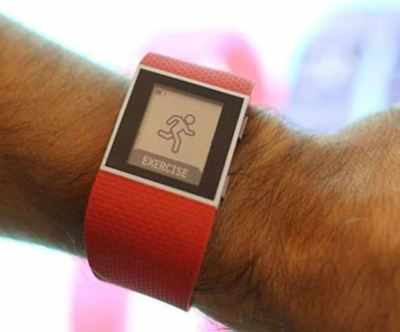
Fitness wearables provide early-warnings for Covid symptoms, study finds
by ANIWASHINGTON DC: Preliminary research has found that constant stream of data from wearable devices such as Oura rings, Fitbits and Apple Watches reveal early-warnings for coronavirus symptoms, days before people could even realize that they have been infected by the contagious infection, The Washington Post reported.
That means fitness trackers could be on their way to becoming sickness trackers.
The initial findings from two academic studies into the data from wearable devices prove to be a small step in the fight against the coronavirus, and a giant leap for wearable tech.
Since March, a half-dozen studies have been exploring whether the constant stream of data that wearables gather about human bodies offers any clue about who may have caught the coronavirus.
On Thursday, researchers at Rockefeller Neuroscience Institute in West Virginia, the US, reported that Oura ring data, combined with an app to measure cognition and other symptoms, can predict up to three days in advance when people will register a fever, coughing or shortness of breath. It can even predict someone's exact temperature, like a weather forecast for the body, the researchers said.
Professor Ali Rezai, the institute's director, was quoted by the Post as saying that the technology is valuable because it is tuned to reveal infection early on when patients are highly contagious but do not know it. He called the combination of the smart ring and app a kind of "digital PPE," or personal protective equipment. 'It can say, "This individual needs to stay home and not come in and infect others,'" he said further.
In addition to this, researchers at Stanford University studying changes in heart rate from Fitbits have also informed that they have been able to detect the coronavirus before or at the time of diagnosis in 11 of 14 confirmed patients they've studied. In this initial analysis, they could see one patient's heart rate jump nine days before the person reported symptoms. In other cases, they only saw evidence of infection in the data when patients noticed symptoms themselves.
"The bottom line is it is working, but it's not perfect," said professor Michael Snyder from the same varsity.
However, accuracy is the question that hangs over detecting the coronavirus from a gadget.
Fitness trackers started as a way to count steps, a relatively low-stakes measure. Marketers pushed the idea that everyone should take 10,000 steps per day, but it was never rooted in much science, the Post reported.
As tech companies have grown more interested in health care, they have added more sensors to wearables. Fitbits now collect heart data, and Google agreed to buy the company last year to get closer to the bodies of millions. Apple was the first to receive Food and Drug Administration clearance for an Apple Watch app that could identify atrial fibrillation.
The researchers feed weeks of historical data into software that hunts for patterns. These algorithms are able to spot things humans usually don't notice about their own bodies, like a slightly elevated resting heart rate. Subtle changes in temperature, heart rate variability and sleep patterns allow the software to make predictions about what is likely to come in the days ahead.
To detect the coronavirus, as opposed to just symptoms, Rezai said they'll need more participants to train algorithms to pick up on the many, sometimes unexpected ways diverse bodies respond to the virus.
Past studies have been able to link wearables data to undetected issues like high blood pressure, arrhythmia and early-stage cancer, and use it to improve real-time tracking of seasonal flu outbreaks.
Therefore, researchers have opined that the coronavirus could be a game-changer. "Because everybody is going through this, it is an opportunity for us to collect data from essentially the entire population, which is very unique," said Duke University professor Ryan Shaw who is leading a study on coronavirus smartphone and smartwatch named 'Covidentify'.